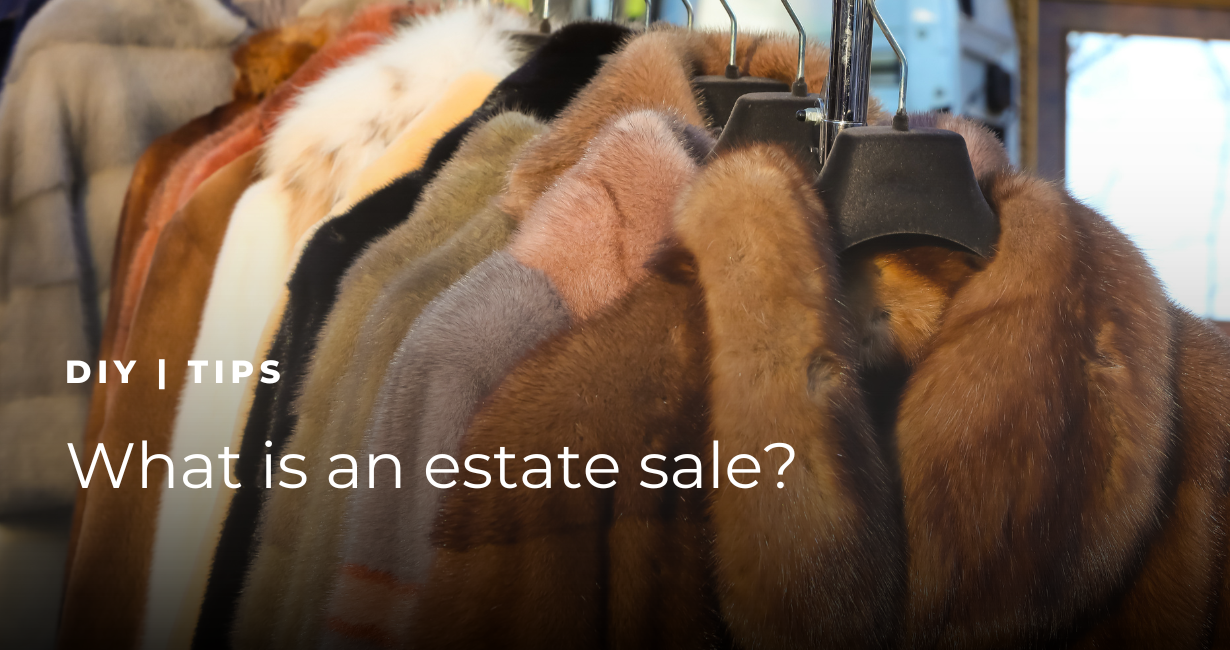What is an Estate Sale?
Posted by Marketing on Friday, August 4th, 2023 at 11:00am.

Estate sales are a popular choice for homeowners and beneficiaries to liquidate assets and prepare a home for sale. Estate sales involve selling all or most of the items belonging to an estate at a price point that reflects their current market value. These items are sold directly from the home, which is opened to the public for a set period of time.
When should you consider holding an estate sale and what will that process involve? Read on to find out.
Why Hold an Estate Sale?
In some cases, estate sales are a legal requirement decided upon in probate court. This may occur when:
- The property owner passes away without having named an heir to their estate.
- The property owner’s heirs can’t come to an agreement on how to divide the property.
In both cases, probate court will divide the proceeds of the liquidated assets amongst the beneficiaries. Estate sales are also a legal requirement if the property owner included their wishes for an estate sale in their will.
That said, many people voluntarily hold an estate sale. The beneficiaries of a property may decide that they’d rather claim liquid assets than the home or property in it. Less commonly, current homeowners may hold an estate sale to prepare for downsizing.
How to Price Items for an Estate Sale
It’s important not to confuse estate sales with estate auctions. In an estate auction, a professional auctioneer will list each item for sale and allow attendees to place bids. In an estate sale, each item is listed for sale at an established price point.
If the goal is to get as much money as possible from the sale, it’s best to request an official appraisal. This is especially recommended if the estate includes fine art, jewelry, antiques, and other high-value items. Note that many estate sellers do not offer appraisal services, though they may offer pricing in their service package. If you’re looking for the most accurate assessment of value, it’s best to hire an actual appraiser.
Is Everything Included in the Sale?
Estate sales do not typically include every single item in the estate. For example, you will want to remove all personal items, such as financial documents, family photos, and items with sentimental value.
In some cases, beneficiaries may claim any items that they wish to keep before the estate sale begins. If specific items were left to named beneficiaries in the will, the named beneficiary is entitled to keep, give away, or sell the item. If you already have a buyer lined up for the house, they may also want to have a say in what sells and what stays. The seller or beneficiary is not legally required to honor the buyer’s interests unless they are spelled out in the contract.
Should You Partner with an Estate Seller?
There are two ways that you can approach an estate sale: you can handle the sale yourself or you can partner with an estate seller. Many people choose the latter because it requires less of their time and may yield better results.
Estate sellers will help to price and prepare items for sale. They will also advertise the sale using both online forums and signage, ensuring that enthusiastic buyers know when and where the sale will take place. Finally, estate sellers will oversee the entire sale, freeing you from the responsibility of having to be on the property while the house is open to the public.
How Much Does It Cost to Hire an Estate Seller?
Working with an estate seller sounds pretty good, so why do some people choose to handle the estate sale on their own? The answer usually comes down to price. Most estate sellers will take between 30-50% of the proceeds, sometimes offering sliding scale rates and taking a lower percentage for higher-value estates.
The tradeoff is that estate sellers offer their connections and experience and may do a better job of selling off more of the estate (items within the home) than you could on your own. They have an incentive to maximize sales and it’s possible that you’ll make more splitting the proceeds with an estate seller than you would handling the entire process alone. However, it’s important to take fees and commission rates into consideration when choosing an estate seller.
Steps to Take After an Estate Sale
Estate sales tend to last several days, typically on the weekend to accommodate the schedules of as many buyers as possible. Chances are, you’ll still have some items left over once the estate sale cycle is complete. Another reason to consider hiring an estate seller is that they will often take care of these remaining items, donating them to appropriate organizations on your behalf.
You may also attempt to sell these remaining items online. Useful online marketplaces include Facebook, Craigslist, and Nextdoor. If your goal is to sell these items quickly, consider lowering the asking price and including a best offer option.
Once the property is satisfactorily emptied, it’s time to partner with a selling agent that can help you find the right buyer for the property itself.
The Takeaway
Estate sales are one of the most popular ways to liquidate an estate and prepare the home for the real estate market. If you’re ready to sell your home or a home you’ve inherited, contact us today!







